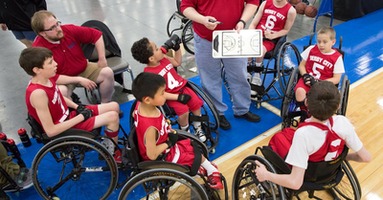
Advocating for Disabled Parking Rights for Children with Autism
Autism Spectrum Disorder (ASD) is a complex neurodevelopmental condition that affects social interaction, communication, and behavior. For children with ASD, navigating public spaces can be challenging due to sensory sensitivities, anxiety, and difficulties with social and environmental cues. As a result, accommodations such as disability passes are essential in ensuring that these children and their families can access public spaces safely and comfortably.
Advocating for disability parking rights for children with ASD involves more than just understanding the legal framework—it requires a proactive approach to ensure that the needs of your child are recognized and met. This article provides a comprehensive guide for parents on how to effectively advocate for their child’s handicap parking rights, including tips on working with local authorities, healthcare providers, and community organizations.
Understanding Disabled Parking Rights and Autism
What Are Disabled Parking Rights?
Disabled parking rights refer to the legal entitlements that allow individuals with disabilities to access designated parking spaces closer to the entrances of buildings and facilities. These spaces are reserved to provide greater accessibility for people who have physical, sensory, or cognitive disabilities that make it difficult for them to navigate public spaces without additional support.
For children with ASD, a handicap tag can be a critical accommodation that helps mitigate the challenges associated with sensory overload, anxiety, and difficulties with mobility. The permit allows families to park closer to building entrances, reducing the distance a child has to walk and minimizing exposure to potentially overwhelming stimuli.
The Importance of Disabled Parking for Children with Autism
Children with developmental disabilites often experience heightened sensitivities to sensory input, which can make the experience of navigating a busy parking lot overwhelming and stressful. The noises, lights, and movement in these environments can trigger sensory overload, leading to anxiety, meltdowns, or other challenging behaviors.
Moreover, children with ASD may struggle with understanding the dangers of a parking lot, increasing the risk of accidents or elopement. A disability pass provides a safer, more controlled environment for these children, allowing them to enter and exit vehicles quickly and with minimal exposure to potential stressors.
Before delving into advocacy strategies, it’s important to understand why accessible parking rights are so critical for children with this type of condition. Autism Spectrum Disorder (ASD) can significantly impact a child’s ability to navigate public spaces due to sensory sensitivities, difficulties with transitions, and challenges in understanding social norms. These challenges can make seemingly simple tasks, such as walking through a parking lot or entering a building, overwhelming and stressful.
a. Safety Concerns
One of the primary reasons disability parking is essential for children with ASD is safety. Children with ASD may have a limited understanding of danger, be prone to wandering, or have difficulty following instructions in chaotic environments. Disability parking spaces, which are typically located closer to building entrances and in safer, less trafficked areas, provide a crucial safety net. They minimize the risk of a child wandering into traffic or becoming overwhelmed in a crowded parking lot.
b. Reducing Sensory Overload
Children with ASD are often hypersensitive to sensory stimuli such as bright lights, loud noises, and strong smells. Public spaces, especially busy parking lots, can be overwhelming, leading to anxiety, distress, or meltdowns. Accessible passes allow families to park closer to entrances, reducing the child’s exposure to these overwhelming stimuli and facilitating a smoother transition into the building.
c. Ease of Access
For children with ASD, the predictability and routine associated with consistently parking in the same, easily accessible spot can help reduce anxiety and behavioral challenges. Handicap tags provide this consistency, making it easier for families to manage public outings and ensuring that children with autism can access essential services, such as medical appointments, therapy sessions, and educational programs, without unnecessary stress.
Legal Framework for Disabled Parking Rights
In the United States, the Americans with Disabilities Act (ADA) provides the legal foundation for accessible parking rights. The ADA mandates that public and private facilities must provide accessible parking spaces for individuals with disabilities, ensuring that they have equal access to services and facilities.
The specific criteria on how to apply for a disabled parking permit for autism vary by state, but generally, the process involves obtaining a medical certification from a handicapMD healthcare provider that verifies the individual's disability and its impact on their ability to navigate public spaces. For children with ASD, this certification typically needs to address how their sensory sensitivities, anxiety, or behavioral challenges affect their mobility and safety in public areas.
Steps to Advocate for Disabled Parking Rights
Advocating for accessible parking rights for your child requires a proactive approach. Below are key steps and strategies to help parents effectively navigate the advocacy process.
1. Educate Yourself About Your Child’s Rights
The first step in advocating for your child’s accessible parking rights is to educate yourself about the legal entitlements and protections available to children with ASD. Understanding the ADA and your state’s specific laws regarding disability passes is crucial.
Resources such as the ADA website, your state’s Department of Motor Vehicles (DMV), and disability advocacy organizations can provide valuable information on the rights of individuals with disabilities and the process for obtaining a handicap tag.
2. Gather Documentation and Support from Healthcare Providers
Healthcare providers play a critical role in the process of obtaining a disability tag for your child. To advocate effectively, you will need to gather documentation that outlines your child’s diagnosis of ASD and how it impacts their ability to navigate public spaces.
Schedule a consultation with a handicapMD healthcare provider to discuss your child’s needs and the benefits of a disability pass. The healthcare provider will need to complete a medical certification form that supports your application for the permit. Ensure that this documentation clearly outlines the specific challenges your child faces, such as sensory sensitivities, anxiety, or elopement risks.
3. Submit the Application and Follow Up
Once you have gathered the necessary documentation, complete the application for a handicap pass through your state’s DMV or equivalent agency. Be sure to include all required documentation and any applicable fees.
After submitting the application, follow up with the DMV to ensure that it is processed in a timely manner. If you encounter delays or issues, don’t hesitate to advocate on your child’s behalf by contacting the DMV directly or seeking assistance from a disability rights organization.
4. Work with Local Authorities and Community Organizations
Advocating for your child’s disability parking rights often involves working with local authorities and community organizations to ensure that the needs of children with developmental disabilties are recognized and accommodated.
a. Engage with Local Government
Engaging with local government officials can be an effective way to advocate for better accessibility and accommodations for children with developmental disabilities. This can include:
Attending City Council Meetings: Participate in city council meetings or other local government forums where issues related to disability rights and accessibility are discussed. Share your child’s experiences and advocate for policies that support the needs of individuals with ASD.
Advocating for Policy Changes: If your community lacks sufficient accessible parking spaces or if existing spaces are not adequate for the needs of children with ASD, consider advocating for policy changes. This may involve working with local government officials to propose new regulations or modifications to existing ones.
Building Relationships with Officials: Developing relationships with local government officials and staff can help you stay informed about upcoming changes to accessibility regulations and provide opportunities to advocate for your child’s needs.
b. Collaborate with Disability Advocacy Organizations
Disability advocacy organizations can be valuable allies in your efforts to secure accessible parking rights for your child. These organizations often have resources, legal expertise, and networks that can support your advocacy efforts.
Join Advocacy Groups: Consider joining local or national disability advocacy groups that focus on ASD or broader disability rights. These groups can provide support, information, and opportunities to collaborate on advocacy initiatives.
Seek Legal Assistance: If you encounter challenges in obtaining a disability pass or if your child’s rights are not being recognized, seek legal assistance from a disability rights attorney or advocacy organization. They can provide guidance on how to navigate the legal process and advocate effectively for your child’s rights.
5. Educate the Community and Raise Awareness
Raising awareness about the needs of children with neurodevelopmental conditions and the importance of disability parking rights is an essential aspect of advocacy. Educating the community can help reduce stigma, increase understanding, and foster a more inclusive environment for your child.
a. Organize Community Education Events
Organizing community education events, such as workshops, seminars, or panel discussions, can be an effective way to raise awareness about ASD and the importance of accessibility accommodations. Collaborate with local schools, community centers, and disability organizations to host these events and share information about the challenges faced by children with ASD.
b. Use Social Media and Online Platforms
Social media and online platforms provide powerful tools for advocacy and awareness-raising. Use these platforms to share information about ASD, the benefits of disability tags, and the importance of accessibility. Consider creating a blog, social media page, or online petition to gather support for your advocacy efforts.
c. Engage with Local Media
Engaging with local media outlets, such as newspapers, radio stations, and television news programs, can help amplify your advocacy message. Reach out to reporters and journalists who cover disability issues and share your child’s story to highlight the importance of handicap parking rights for children with neurodevelopmental conditions.
6. Advocate for Enforcement and Compliance
Ensuring that accessible parking spaces are used appropriately and that your child’s rights are protected requires ongoing advocacy for enforcement and compliance with accessibility laws.
a. Report Violations
If you notice that accessible parking spaces are being misused—such as by individuals without a valid permit—report the violation to local authorities or the property owner. Many cities have hotlines or online reporting systems for parking violations.
b. Advocate for Better Enforcement
Advocate for stronger enforcement of accessible parking regulations in your community. This can include working with local law enforcement agencies to increase patrols of parking lots, encouraging property owners to install better signage and monitoring systems, and pushing for higher fines for violations.
c. Monitor Accessibility in Your Community
Regularly monitor the availability and condition of accessible parking spaces in your community. If you notice that spaces are not being maintained, are blocked, or are inadequate for the needs of children with ASD, take action by reporting the issue to local authorities and advocating for improvements.
7. Build a Support Network
Advocating for your child’s accessible parking rights can be a challenging and sometimes isolating experience. Building a support network of other parents, caregivers, and advocates can provide you with the encouragement, resources, and shared experiences you need to continue your advocacy efforts.
a. Connect with Other Parents and Caregivers
Connecting with other parents and caregivers of children with ASD can provide valuable support and insights. Join local support groups, online forums, or social media groups where you can share your experiences, ask questions, and learn from others who are navigating similar challenges.
b. Participate in Advocacy Campaigns
Participating in advocacy campaigns organized by disability rights organizations can help you connect with others who share your passion for promoting accessibility and inclusivity. These campaigns often focus on broader issues related to disability rights, but they can also provide opportunities to advocate for specific needs, such as disability parking rights for children with developmental disabilities.
c. Stay Informed and Involved
Staying informed about developments in disability rights, accessibility laws, and ASD research is essential for effective advocacy. Subscribe to newsletters, attend conferences, and participate in webinars to keep up-to-date with the latest information and trends.
Overcoming Challenges in Advocacy
Advocating for disability parking rights for children with ASD can be a complex and sometimes frustrating process. You may encounter resistance from local authorities, misunderstandings from the community, or challenges in navigating the legal system. However, by staying persistent, informed, and connected with a support network, you can overcome these challenges and successfully advocate for your child’s rights.
Dealing with Resistance
Resistance from local authorities or community members is a common challenge in advocacy. Some people may not understand the specific needs of children with ASD or may question the necessity of a handicap tag for a non-physical disability.
To overcome resistance, focus on educating and raising awareness. Provide clear, evidence-based information about the challenges faced by children with developmental disabilities and the benefits of accessible passes. Share personal stories and experiences that highlight the positive impact of these accommodations on your child’s safety and well-being.
Navigating the Legal System
Navigating the legal system to secure your child’s disability parking rights can be daunting, especially if you encounter bureaucratic obstacles or delays. To overcome these challenges, consider seeking legal assistance from a disability rights attorney or advocacy organization. They can help you understand your rights, navigate the application process, and take action if your child’s rights are not being recognized.
Addressing Misconceptions and Stigma
Misconceptions and stigma surrounding ASD and disability parking rights can create additional barriers to advocacy. Some people may mistakenly believe that disability tags should only be available to individuals with visible physical disabilities or may not understand the unique challenges faced by children with neurodevelopmental conditions.
Addressing these misconceptions requires ongoing education and awareness-raising efforts. Use every opportunity to inform others about ASD, the importance of accessibility, and the specific needs of children with ASD. By challenging stereotypes and promoting understanding, you can help create a more inclusive and supportive community for your child.
Conclusion: Empowering Parents to Advocate for Their Child’s Rights
Advocating for disability parking rights for children with ASD is a critical aspect of ensuring that they have the accommodations and support they need to navigate public spaces safely and comfortably. While the process may involve challenges, parents have the power to make a significant difference in their child’s life by taking proactive steps to secure these rights.
By educating yourself about your child’s rights, working with healthcare providers, engaging with local authorities and community organizations, and raising awareness in your community, you can advocate effectively for your child’s needs. Building a support network and staying informed about developments in disability rights and ASD advocacy will also strengthen your efforts and help you overcome challenges along the way.
Remember, advocacy is not just about securing a handicap tag—it’s about ensuring that your child’s needs are recognized and accommodated in every aspect of their life. By standing up for your child’s rights, you are helping to create a more inclusive and accessible world where children with ASD can thrive.
For more information on how to advocate for your child’s disabled parking rights and to learn about the application process, visit HandicapMD.com.
References
- Americans with Disabilities Act (ADA). (2023). Disability Rights. Retrieved from https://www.ada.gov/disability-rights/
- National Conference of State Legislatures (NCSL). (2022). Disabled Parking Permit Laws. Retrieved from https://www.ncsl.org/research/transportation/disabled-parking-permits.aspx
- Centers for Disease Control and Prevention (CDC). (2023). Autism Spectrum Disorder (ASD). Retrieved from https://www.cdc.gov/ncbddd/autism/index.html
- Autism Society. (n.d.). Advocacy and Autism. Retrieved from https://www.autism-society.org/advocacy-and-autism/
.png)






